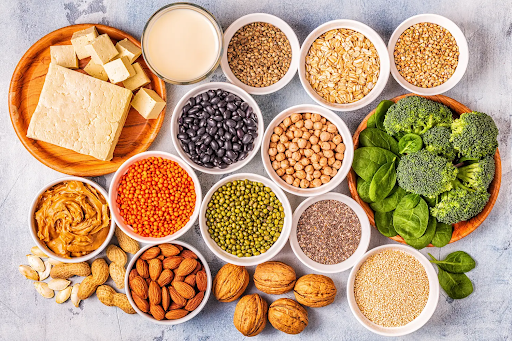A Beginner’s Guide to Cooking With Plant Based Chicken at Home
A Beginner’s Guide to Cooking With Plant Based Chicken at Home
Blog Article
Everything About Healthy Food: Benefits of Taking On Plant Based Options
The conversation bordering plant-based diet plans has obtained significant attention in recent times. Many people are exploring the possible health and wellness advantages, nutritional benefits, and environmental influences related to these nutritional choices. As people become extra knowledgeable about their food's impact on health and sustainability, inquiries occur regarding the usefulness of embracing such a lifestyle. What specific adjustments can one expect, and how might these selections reshape not only personal health and wellness but additionally the world's future?
Understanding Plant-Based Diet Plans
Several individuals associate plant-based diet plans mainly with vegetarianism or veganism, these diet regimens can incorporate a broad array of eating patterns that prioritize whole, minimally refined plant foods. Such diets usually include fruits, vegetables, entire grains, nuts, seeds, and beans, while limiting or removing animal items. This flexibility enables people to tailor their nutritional choices according to dietary requirements and individual preferences. Some may adopt a mainly plant-based diet plan while still sometimes consuming meat or milk, typically described as a flexitarian technique. The focus remains on incorporating more plant foods, which can lead to a diverse range of tastes and dishes. Comprehending these different analyses of plant-based eating is important for valuing its availability and charm in contemporary food culture.
Health And Wellness Conveniences of Plant-Based Foods
The health advantages of plant-based foods are significant, providing a nutrient thickness advantage that sustains total well-being. Research study shows that these foods can improve heart health and wellness and play a vital role in reliable weight monitoring. By integrating a lot more plant-based alternatives, people might boost their dietary options and advertise long-term health.
Nutrient Thickness Benefit
Nutrient thickness plays a necessary function in the wellness benefits of plant-based foods, making them a compelling selection for those looking for a balanced diet. Plant-based foods, such as fruits, veggies, legumes, nuts, and whole grains, are usually abundant in necessary vitamins, minerals, and anti-oxidants while being lower in calories. This high nutrient density enables individuals to eat less calories while still fulfilling their nutritional demands. In addition, these foods are packed with nutritional fiber, promoting digestive health and helping in weight monitoring. By including nutrient-dense plant-based options, customers can enhance their total health, sustain their body immune systems, and lower the risk of chronic illness. Eventually, the nutrient thickness of plant-based foods underscores their value in a health-conscious lifestyle.
Heart Health Enhancement

Weight Management Assistance
In addition to promoting heart health and wellness, a plant-based diet regimen can substantially help in weight monitoring. This nutritional technique stresses whole foods such as fruits, veggies, vegetables, nuts, and entire grains, which are normally reduced in calories and higher in fiber compared to animal-based products. The high fiber web content aids raise satiation, lowering general calorie intake. Moreover, plant-based diet plans are frequently abundant in vital nutrients while low in undesirable fats, making it easier to keep a healthy weight. Plant Based Beef. Research study suggests that individuals who take on a plant-based way of living tend to have reduced body mass indexes (BMIs) and experience more successful weight reduction compared to those that consume meat-heavy diet regimens. Subsequently, embracing plant-based options is a critical selection for efficient weight administration
Nutritional Value of Plant-Based Components
Plant-based components are abundant in necessary nutrients, providing a diverse array of vitamins, minerals, and anti-oxidants that add to general health and wellness. A comparison of protein sources exposes that while pet items are frequently watched as superior, many plant-based choices give sufficient protein and various other beneficial compounds. Comprehending the dietary value of these ingredients can help people make informed dietary options.
Important Nutrients in Plants
Nutrient-rich ingredients found in plants offer a varied variety of vital nutrients that add considerably to general wellness. These active ingredients are abundant in vitamins A, C, and K, which support immune feature, vision, and blood clotting, specifically. Furthermore, plants offer important minerals such as calcium, potassium, and magnesium, critical for heart wellness, muscle mass feature, and bone stamina. The existence of fiber in plant-based foods help digestion and promotes a healthy and balanced gut microbiome. Antioxidants, found generously in veggies and fruits, help combat oxidative stress and minimize inflammation. Numerous plant foods are reduced in calories yet high in nutrients, making them an outstanding selection for those looking for to maintain a healthy and balanced weight while ensuring suitable nutrient intake.

Contrasting Healthy Protein Sources
Healthy protein resources differ significantly in their nutritional profiles, with plant-based active ingredients supplying special benefits. Unlike animal proteins, which typically include saturated fats and cholesterol, plant healthy proteins often tend to be reduced in these undesirable components. Legumes, nuts, seeds, and entire grains are rich in vital amino acids, fiber, vitamins, and minerals. Lentils supply high healthy protein material alongside significant iron and folate, while quinoa is a complete protein, offering all nine important amino acids. Additionally, plant-based healthy proteins are typically accompanied by anti-oxidants and phytochemicals that sustain general wellness. The shift to plant-based healthy protein sources not only boosts nutritional consumption however additionally aligns with lasting dietary techniques, minimizing environmental impact and advertising long-term wellness benefits.
Ecological Impact of Plant-Based Consuming
As awareness of environment adjustment expands, many individuals are checking out lasting dietary selections that can considerably lessen their ecological footprint. Plant-based consuming has emerged as a substantial contributor to minimizing greenhouse gas emissions, which are mostly connected with livestock manufacturing. The cultivation of fruits, grains, vegetables, and beans generally needs less sources, such as water and land, contrasted to animal farming. Furthermore, plant-based diet regimens can bring about decreased deforestation, as much less land is needed for grazing livestock or growing animal feed. By moving company website in the direction of plant-based alternatives, consumers can support biodiversity and promote healthier environments. Overall, embracing plant-based eating not only benefits personal health and wellness however likewise stands for a crucial step towards environmental sustainability and conservation efforts.
Overcoming Common Misconceptions
While several individuals acknowledge the benefits of a plant-based diet regimen, a number of mistaken beliefs typically discourage them from completely welcoming this lifestyle. A common idea is that plant-based diet regimens do not have adequate protein; nonetheless, numerous plant resources, such as legumes, nuts, and tofu, give enough protein. Furthermore, some think that this diet is costly, when actually, staples like beans, rice, and seasonal vegetables can be quite cost effective. An additional misconception is that plant-based eating is overly restrictive, whereas it in fact supplies a varied selection of flavors and foods. Finally, lots of worry that a plant-based diet might lead to shortages, yet with appropriate preparation, people can obtain all essential nutrients, including minerals and vitamins, while delighting in a variety of delicious dishes.
Tips for Transitioning to a Plant-Based Lifestyle
Making the change to a plant-based way of living can be an enhancing experience, though it typically requires some support to browse the initial modifications. First, individuals are motivated to start gradually, including even more fruits, vegetables, legumes, and whole grains into their meals while minimizing meat and milk consumption. Meal planning is crucial; preparing a weekly menu can help alleviate the change and avoid last-minute undesirable selections. Checking out cooking techniques and brand-new dishes can also maintain and boost the experience exhilaration regarding plant-based consuming. Additionally, signing up with assistance groups or communities can offer motivation and share beneficial ideas. Remaining notified concerning nutrition guarantees balanced meals, protecting against deficiencies while cultivating a healthy and balanced, rewarding plant-based lifestyle.

Delicious Plant-Based Dish Ideas
Discovering tasty plant-based meal ideas can motivate individuals to accept a much more nutritious diet regimen. One preferred choice is a passionate quinoa salad, featuring cherry tomatoes, cucumber, and a vibrant lemon-tahini clothing. An additional fave is a tasty lentil stew, packed with carrots, celery, and great smelling herbs, perfect for a soothing supper. For morning meal, overnight oats made with almond milk, chia seeds, and topped with fresh berries provide a nutritious start to the day. In addition, a vibrant vegetable stir-fry with tofu and a click reference selection of colorful veggies can be a fast yet pleasing dish. Finally, luscious avocado toast on whole-grain bread, sprayed with seeds and flavors, provides a straightforward yet savory snack. These meals showcase the range and richness of plant-based eating.

Frequently Asked Inquiries
Can a Plant-Based Diet Offer Sufficient Healthy Protein?
The inquiry of whether a plant-based diet plan can give enough protein prevails. Many resources, Visit This Link consisting of legumes, nuts, seeds, and entire grains, can fulfill protein needs properly, supporting a well balanced and nourishing diet regimen for people.
Are Plant-Based Diet Plans Ideal for Children?
The viability of plant-based diets for kids relies on cautious planning. Ample nutrients have to be ensured, consisting of vitamins, healthy proteins, and minerals. With correct advice, such diet plans can support healthy and balanced growth and development in kids.
How Do I Eat in restaurants on a Plant-Based Diet regimen?
Dining out on a plant-based diet plan includes looking for restaurants with diverse menus, asking for adjustments, and checking out vegan-friendly choices. Preparation in advance and communicating dietary choices can improve the eating experience while keeping dietary options.
What Are Common Irritants in Plant-Based Foods?
Typical allergens in plant-based foods consist of soy, gluten, nuts, and seeds - Plant Based Beef. People complying with a plant-based diet ought to recognize these irritants and review tags thoroughly to stay clear of unfavorable responses and assure safe intake
Can Plant-Based Diets Aid With Weight-loss?
Research study indicates that embracing a plant-based diet plan might facilitate weight loss due to its typically reduced calorie thickness and higher fiber material. This combination can boost satiety, helping individuals handle their calorie consumption successfully. Many people associate plant-based diet regimens mostly with vegetarianism or veganism, these diet regimens can incorporate a vast array of consuming patterns that focus on entire, minimally processed plant foods. Nutrient density plays a necessary duty in the wellness advantages of plant-based foods, making them an engaging option for those seeking a balanced diet. Plant-based diets have actually been revealed to substantially enhance heart health, as they usually contain components that sustain cardiovascular feature. In enhancement to promoting heart health, a plant-based diet can substantially assist in weight monitoring. A typical belief is that plant-based diet regimens do not have sufficient protein; however, countless plant sources, such as legumes, nuts, and tofu, give adequate protein.
Report this page